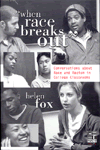Reader, I’ll tell you a secret. I’m not sure I like Kathleen Berry. Well, okay, it’s a love-hate relationship. At times while reading her essay, from Chapter 1 of The Great White North, I found myself whole-heartedly cheering her on. At other times, I was confused to the point of annoyance. I think I will be better able to articulate the essence of my disagreement with, or misunderstanding of, Berry after the class discussion and some extra reading on my part. Maybe a few more cups of coffee will do it. For now, though, I will respond to her concluding questions about Whiteness, privilege, and how we might recognize and fight against the institutionalized and systemic bias in favor of Whiteness that exists in Canadian society. (I want to say that on this point, I agree with Berry entirely that racism still exists, and that it is a problem that should be recognized and addressed.)
And so let us recognize it. Berry asks the readers at the end of her essay to identify ways in which Whiteness has entered their lives in Canada as either privilege and/or oppression. This is at once a very easy, and a very difficult task to address. As a White Canadian, I am aware that my ethnicity does indeed afford me privileges, but this awareness is mostly abstract. It is not specific; it is not personal. There are only a few incidents in my life in which I can recall being privileged because I am White, or being discriminated against because I am White. I will give an example of both types of experience here, and then discuss the issue of Whiteness in a more abstract way.
As I suspect is the case with most people, I recognize my own privilege almost exclusively when I realize the disadvantages of someone who is not White. I remember dating a Mohawk boy in grade six, and my mother was disgusted that I’d associate myself with someone "from the reservation" (in fact, Steven lived two streets over in a bigger house than ours). I remember being stricken by the unfairness of my mother’s distaste for someone because of his race. Was this how the teachers at school thought about him? After that, I was hawkish when watching how Steven was treated by the faculty and staff, ready to pounce on anyone who gave him so much as a dirty look (it was my way of compensating, of course, for the fact that I was too cowardly to pounce on my mother).
But incidents like the one above have been few and far between in my life. Similarly, I have few personal experiences with being the target of racial prejudice. One rather pathetic example happened when I was sixteen and I was at a friend’s birthday party in Mississauga. Every other girl there was either Asian or Black. This, compounded with the fact that I didn’t know any of them, made me feel more than a little conspicuous. When they asked me if I wanted to go with them to get ‘Bubble-Tea,’ and I admitted that I had no idea what they were talking about, one girl laughed and said, "You’re really White, aren’t you?" I shrugged and asked her how she'd managed to figure that one out. Was it the white skin, or the utter lameness of me that gave it away?
That night, I forced down the vile mixture of milk, tea and tapioca balls as if it were a magic elixir that could exculpate me of my Whiteness. When I returned to Montreal, I found a place that sold Bubble-Tea and made a habit of drinking it often, drinking it in public, and telling everyone how great it was. Eventually I developed a taste for it, but it didn’t matter because around that time that I decided to stop drinking it on principle.
Now, I warned you that the example was pathetic! You see now, Reader, the paucity of real experience with prejudice from which I have to draw when trying to imagine what being the victim of racism must be like. I can only say that recently, by virtue of my writing on current events for the purposes of this blog, I have become more aware of the racism and xenophobia that is rampant in Quebec and Canadian culture. It has left me surprised, disillusioned, and eager to effect change. About a month ago, I mused that perhaps my envy of my peers’ cultural distinctiveness had "blinded me to the possibility that this distinctiveness might be a target of bigotry." I can now say that most certainly this is the case. Ironically, the invisibility of my race, which is what perpetuated my feelings of what I called ‘cultural impoverishment,’ is also the mechanism through which the bias in favour of Whiteness propagates.
This suggests to me that not only does the invisibility of Whiteness affect minorities negatively, but it is also detrimental to White identity. Often, there is no racial self-examination for the White Canadian. There is no identity moratorium of a cultural dimension, which, I think, cheapens White identity as something to be taken for granted. Therefore, while it is a privilege not to be labeled as "other" and not to be the object of bigotry, the absence of any critically-achieved cultural identity can also be oppressive to the soul. At least, I think it has been for mine.
In a related question, Barry asks her readers to consider ways in which they, their students and their families and can work to articulate and transform the authority of Whiteness at the individual, societal, community and institutional levels of Canada. I feel very strongly that the articulation must precede the transformation. This blog, our class discussions, our discussions around the dinner table with friends and family, our voices in more public places will be essential to shaping the future of this nation. We must talk amongst ourselves, and then we must talk to those who disagree with us – letters to newspapers, letters to MPs, and public debate are essential.
Although I take issue with many of the opinions being expressed at the Bouchard-Taylor hearings, I think that this kind of public forum is a valuable part of the dialogue. Their website includes a survey you can take to express how you feel about reasonable accomodation in this province. The commission is still hearing statements from the public - you can see their schedule here.
As a citizen, I feel compelled to stay informed and to participate in the conversation - passionately, vocally, and with conviction. As a teacher, however, my philosophy is somewhat different. That is, I do not think it is appropriate to place emphasis on racial issues in a science classroom. This is not to say that a discussion about racial issues isn't important, but only that these issues are not to be debated at the expense of a child's scientific literacy.
When I teach science, I will pay homage to the contributions of White scientists when White scientists deserve the credit, Black scientists when Black scientists deserve the credit, and Chinese scientists when Chinese scientists deserve the credit, and so on. I will point out relevant examples of where racism and sexism have manifested themselves in the history of science. In short, I will teach my subject fairly. I will treat all my students fairly and with sensitivity to their cultural backgrounds. I will not tolerate racism in my classroom. I will not tolerate anything that compromises the academic quality of the class I teach. The way I see it, the best thing I can do for my Minority students is exactly the same as the best thing I can do for my White students: teach them good science.













4 comments:
Ah, Kristen
I just left a long and thoughtful comment, and got an error message! I won't rewrite it all, will save it for the next one. It's a pleasure to see your passionate, informed and engaged educator identity forming in your thought processes.
See you in class,
Lisa
Additional information
blogID: 4191901940098743555
host: www.blogger.com
postID: 2175551282945785162
uri: /comment.do
This information will help us to track down your specific problem and fix it! We apologize for the inconvenience.
Hi Kristen,
(oops that previous "comment deleted" was my first failed attempt)
Thank you for your comment...for opening a sort of discussion. This comment is not just a polite act of reciprocity--I too have been perusing a few blogs. One thing I am aware of is that you seem to have given voice to feelings that I have encountered in just thinking about the relation of race and racism and the classroom. I am really struggling with the question of how awareness is to be taught/encouraged with regard to subject matter. Your maintenance that "...the best thing I can do for my Minority students is exactly the same as the best thing I can do for my White students: teach them good science" is something that resonates deeply with me. I often feel that one of the best ways to combat racism is to move forward towards something that is more universal. Obviously you want your starting point to be as free from discrimination as possible. I guess that comes with learning about and from history. But I am of the conviction, as you seem to be, that as a teacher a forward trajectory is really important.
Thanks for this thought--it's difficult sometimes to keep that focus in mind, especially given the evidence of the extent of systematized discrimination. But it's good to know that others are not giving up a sort of hopeful conviction in their subject matter.
Haha but really it was the giant Bubble tea that caught my eye...mmmmm
Yes undoubtedly, in some moments I can reveal that I jibe consent to with you, but you may be inasmuch as other options.
to the article there is even now a suspect as you did in the decrease delivery of this demand www.google.com/ie?as_q=college road trip (2008) ?
I noticed the utter you suffer with not used. Or you use the dark methods of development of the resource. I take a week and do necheg
Post a Comment